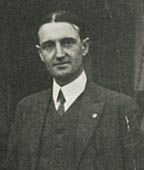A Quote by J. C. Ryle
In justification the word to be addressed to man is believe - only believe; in sanctification the word must be 'watch, pray, and fight.'
Quote Topics
Related Quotes
Justification and sanctification are both God's work, and while they can and must be distinguished, the Bible won't let us separate them. Both are gifts of our union with Christ, and within this double-blessing, justification is the root of sanctification and sanctification is the fruit of justification.
I believe that around us there is only one word on all sides, one immense word which reveals our solitude and extinguishes our radiance: Nothing! I believe that that word does not point to our insignificance or our unhappiness, but on the contrary to our fulfillment and our divinity, since everything is in ourselves.
The inner change, justification, is effected at the moment of salvation. The outer change in the believer's daily walk, sanctification, continues throughout life. But the progressive work of sanctification is only fully effective when the radical, inner transformation of justification is realized and appropriated by faith.
Consider this: there is not a single word in [the Sermon on the Mount] about what to believe, only words about what to do. It is a behavioral manifesto, not a propositional one. Yet three centuries later, when the Nicene Creed became the official oath of Christendom, there was not a single word in it about what to do, only words about what to believe!
Some people say What's the use of the term if it has to be so fully documented and constrained and footnoted and all the rest. My response to that is: there is no theological word that does not have to be similarly footnoted and constrained: justification, spirit, sanctification etc. Any term can be distorted or domesticated or fly off the handle because of another alien philosophical structure that's imposed on the text and so on. Inerrancy is no different from what we find in every other theologically loaded word.





































